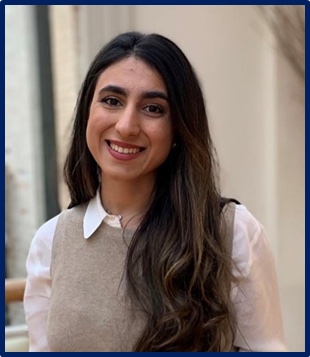Making a difference at the Familial Cancer Clinic: How great mentorship and navigating imposter syndrome contributed to a change in diagnostic pathways
I was a first-year medical student when I contacted Professor Finlay Macrae from the Department of Medicine over email to get involved in his research projects. I had recently finished my undergraduate degree in Queensland in Medical Science and found my research subjects enjoyable. With enthusiasm, fear of my move to Melbourne, and a quick Google search, I reached out to multiple clinicians for research opportunities. Professor Finlay Macrae was one of the few that got back to me.

Pictured: Ms Nadine Abhu Ghazaleh, a final-year Doctor of Medicine student.
During our first interaction, a 10-minute coffee meeting, Professor Macrae told me to read up on Lynch Syndrome, a hereditary form of cancer. I had never heard of it and so he spelled it out for me as I quickly scribed it on his business card.
Over the course of weeks, Professor Macrae gave me multiple research tasks to complete for various established projects. Throughout every interaction I vacillated between egomania and a complete feeling of “I am a fraud, he is going to find out that I am not as good as he thinks”. I constantly wondered, how a clinician with an international reputation would trust a first-year medical student. It is only in retrospect that I can identify this as the bliss-point between ‘imposter syndrome’ and great mentorship.
I managed to impress Professor Macrae by showing up and sticking to The Three Ls: don’t be late, don’t be lazy, don’t lie. Quickly, I figured out that I could harness my inexperience to embrace my supervisor’s expectations and passion for innovation and so I decided to come up with my own research project. I took off my training-wheels and conducted a literature review to identify the gaps in the diagnosis and management of Lynch Syndrome. A year later, I came up with my research protocol, the first systematic review and metanalysis of the worldwide prevalence of Lynch Syndrome in colorectal cancer patients.
Our research project was a systematic review of the current landscape of screening and diagnostic strategies for Lynch Syndrome identification. It informed discussions, more empirically, on colonoscopy provision and presented optimal strategies for effective detection and preventative actions in familial cancer clinics. The main finding of our project was that universal germline testing, a genetic blood test, increases the identification yield of Lynch Syndrome compared to testing tumours. Furthermore, clinicians auditing their own jurisdictions will find the information from our project invaluable to benchmark their experience in identifying Lynch Syndrome. If the prevalence of Lynch Syndrome falls short of the benchmark established in our research paper, it should be a stimulus to public oncological health to identify the gaps in leading to studying failures of universal testing, pathology quality control processes, communication and referral pathways and an understanding of barriers to attendance for genetic counselling.
Our work has been presented in multiple conferences including the Australian Gastroenterology Week, Collaborative Group of the Americas on Inherited Gastrointestinal Cancer, and Asian Pacific Digestive Week. It has also been recently published in Genetics in Medicine, the official journal of the American College of Medical Genetics and Genomics.
I must admit, implementing this project was a huge learning curve that I would not have overcome without the mentorship of my other supervisors and co-authors Dr. Varun Kaushik, Ms Alexandra Gorelik, and Professor Mark Jenkins. At many times, I felt like giving up on this uphill battle of trying to achieve something I did not feel skilled at. But my monthly meetings with Professor Macrae always managed to highlight the clinical importance of our work, something we often fail to see in the midst of the monotonous day-to-day tasks of research. I also found comfort in the words of Jacob Riis, a social documentary photographer:
“When nothing seems to help, I go back and look at the stonecutter hammering away at his rock perhaps a hundred times without as much as a crack showing in it. Yet at the hundred and first blow it will split in two, and I know it was not that blow that did it, but all that had gone before.”
I am humbled by the fact that there is so much we do not know about the human body. We owe every medical improvement to decades of investment in medical research. Medical research requires a beautiful blend of patience and consistency even though the outcomes are often uncertain. The patient is always at the forefront of every research protocol. I am hopeful that our work will reach out to multiple familial cancer clinics to increase the rate of early detection of cancer in families. The patient is what matters the most, I know this for a fact. Early bowel cancer screening gave my father a second chance. Every patient deserves a second chance, a chance to live a longer and healthier life.